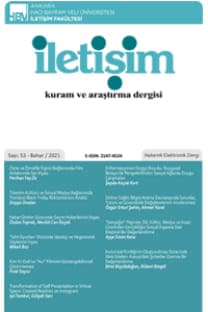Gazetecilik ve Ek İş: Uluslararası 242 Etik İlkenin Karşılaştırması
Journalism and Moonlighting: An International Comparison of 242 Codes of Ethics
___
- Abrahamson, M. (1967). The Professional in the Organization. Chicago: Rand McNally.
- Allison, M. (1986). A Literature Review of Approaches to the Professionalism of Journalists. Journal of Mass Media Studies, 1(2), 5-19.
- Berkowitz, D. & Limor, Y. (2003). "Professional Confidence and Situational Ethics: Assessing the Social-professional Dialectic in Journalistic Ethics-Decisions". Journalism & Mass Communication Quarterly, 80(4), 783-801.
- Bertrand, C.J. (2000). Media Ethics & Accountability Systems. New Brunswick, NJ: Transaction.
- Black, J., Steele, B.& Barney, R. (1995). Doing Ethics in Journalists. Boston: Paramount.
- Boode, W. (1972). Community within Community: The Professions. In: R.M. Pavalko (Ed.), Sociological Perspectives on Occupations (pp. 17-25). Itasca, 111.: F.E. Peacock.
- Broddason, T. (1994). The Sacred Side of Professional Journalism, European Journal of Communication, 9, 227-248.
- Bruun, L. (ed.) (1979). Professional Codes in Journalism. Vienna: International Organization of-Journalists.
- CIA Factbook (2003). Retrieved June 2003 from www.cia.gov/publications/factbook.
- Cooper, T. (1990). Comparative International Media Ethics, Journal of Mass Media Ethics, 5(1), 3-14.
- Christians, C.G., Rotzoll, K.B. & Fackler, M. (1983). Media Ethics: Cases and Moral Reasoning. New York, N.Y.: Longman. Croatian Media Situation Deteriorating, Warns Journalists' Union (2002). IJNet. Retrieved June 15, 2003, from http://www.ijnet.org/Archive/2002/ll/l- 13627.html.
- Day, L.A. (1991). Ethics in Media Communications: Cases and Controversies, Belmont, CA: Wadsworth.
- Erickson, J. (1995). Here Are Some Of The Ways Business Journalism's Wealthiest Members Earned Their Income Last Year. TJFR , 9(5). Retrieved June, 15, 2003 from http://www.tjfr.com/secure/archivel995/0395moonlighting915.htm.
- Freedom of the Press 2003 (2003). New York: The Freedom House. Retrieved June 15, 2003 from http://www.Freedomhouse.org .
- Freidson, E. (1994)'. Professionalism Reborn - Theory, Prophecy and Policy, Chicago: University of Chicago.
- Glassman, J. K. (March 28, 1995). Scandal Watch: Journalists, Beware. Washington Post, p. A17.
- Greenwood, E. (1972). Attributes of a Profession. In: R.M. Pavalko (Ed.), Sociological Perspectives on Occupations (pp. 3-16). Itasca, Illinois: F.E. Peacock.
- Hafez, K. (2002). Journalism Ethics Revised: A comparison of Ethics Codes in Europe, North Africa, the Middle East, and Muslim Asia, Political Communication, 19, 225-250.
- Hallin, D. (1992). The passing of 'High Modernism' of American Journalism. Journal of Communication, 42(3), 14-25.
- Herman, E.S. and Chomsky, N. (1988). Manufacturing Consent. New York: Pantheon.
- Hughes, E.C. (1971). The Sociological Eye, Chicago: Aldine-Atherton. ,
- Hulteng, J.L. (1981). Playing it Straight. Chester, CT: Old Chester Road.
- Jensen, J.V. (1997). Ethical Issues in the Communication Process, Mahwah, NJ: Lawrence Erlbaum.
- Jones, C.J. (1980). Mass Media Codes of Ethics and Councils: A Comparative International Study on Professional Standards. Paris: UNESCO.
- Karatnychy, A. (2002). Nations in Transit 2002: A Mixed Picture of Change. Retrieved January 15, 2004, from http://www.freedomhouse.org/research/ nattransit.htm.Kasoma, F.P. (1994). Journalism Ethics in Africa. Nairobi: Creda Press.
- Laitila, T. (1995). Journalists Codes of Ethics in Europe, European Journal of Communication, 10 (4), 527-544.
- Mann, R. (2003). Zakazukha. Haayin Hashviit 42, 44-45. (Hebrew)
- McChesney, R.W. (1999). Rich Media Poor Democracies. II: University of Illinois Press,
- McManus, J.H. (1994). Market-Driven Journalism. Thousands Oaks, CA; Sage.
- McQuail, D. (1994). Mass Communication Theory (3rd ed.). London: Sage.
- Mosco, V. (1996). The Political Economy of Communication. London: Sage.
- Mukeredzi, T. (2003). Zimbabwe Moonlighting. African News Bulletin, 450. Retrieved June 15, 2003, from http://www.peacelink.it/anb-bie/nr450/e08.html.
- Nyamnjoh, F.B. (2000). West Africa: Unprofessional and Unethical Journalism. In: M. Kunczik (Ed.), Ethics in Journalism : A Reader on Their Perception in the Third World . Retrieved January 19, 2004, from http://library.fes.de/fulltext/iez/ 00710toc.htm
- Patterson, P. & Wilkins, L. (2002). Media Ethics: Issues and Cases. New York, N.Y: McGraw-Hill.
- Pereira, D. (2003). Cash rolling in for enterprising Arabs. The Straits Times. Retrieved June 15, 2003, from http://straitstimes.asial.com.sg/iraqwar/story/ 0,4395,179705,00.html.
- Sarwar, B. (2000). Press Vulnerable under Sword of Martial Law. Asia Times OnLine. Retrieved June 15, 2003 from http://www.atimes.com/media/ BB29Ce01.html.
- Schudson, M. (1978). Discovering the News. New York: Basic Books. — (1990). Origins of the Ideal of Objectivity in the Professions. New York: Garland.
- Schiller, D. (1979). An Historical Approach to Objectivity and Professionalism in American News Reporting. Journal of Communication, 29(4), 46-57.
- Situation in the Trade is Drastically Bad (2002). Media Center Belgrade. Retrieved June 15, 2003, from http://www.yumediacenter.com/english/dogadjaji/2002/ 9/dl 10902e.html. Son, T. (2002). Leaks: How do Codes of Ethics Address Them?, Journal of Mass Media Ethics, 17(2), 155-173. T
- The World Bank (2002). World Developmental Indicators, pp. 12-14. Washington, DC: The World Bank.
- Tuchman, G. (1973). Making News by Doing Work: Routinizing the Unexpected. American Journal of Sociology, 79(1), 111-131.
- Underwood, D. (1993). When MB As Rule the Newsroom. New York: Columbia University Press.
- Weaver, D.H. (1998). The Global Journalist. Cresskill, NJ: Hampton Press.
- Yayın Aralığı: 3
- Başlangıç: 1983
- Yayıncı: Ankara Hacı Bayram Veli Üniversitesi İletişim Fakültesi
Medya ve Etik: Eleştirel Bir Giriş
Türkiye'de Bilgi İletişim Teknolojileri: Bir Etik Tartışma Alanı Olarak Yazılım Korsanlığı
"Gazetecilik Etiği" Dersi Çerçevesinde Etik Sorunlara Akademik Yaklaşımlar
Görünmez Tehlike: Spin Doktorları Medya Etik Kurallarını Nasıl Atlarlar?
Modernleşme, Toplumsal Yaşamın Hukuksallaşması ve Etik
İletişim Etiği ve Enformasyon: Küresel Dünyanın Vatandaşları Kendileri İçin Düşünüyorlar
İletişim ve Kriz: Enformasyona Dayalı Kapitalizm ve Kontrol
Mahremiyetin Sınırları: Yararlı Ayrımlar
Gazetecilik ve Ek İş: Uluslararası 242 Etik İlkenin Karşılaştırması
